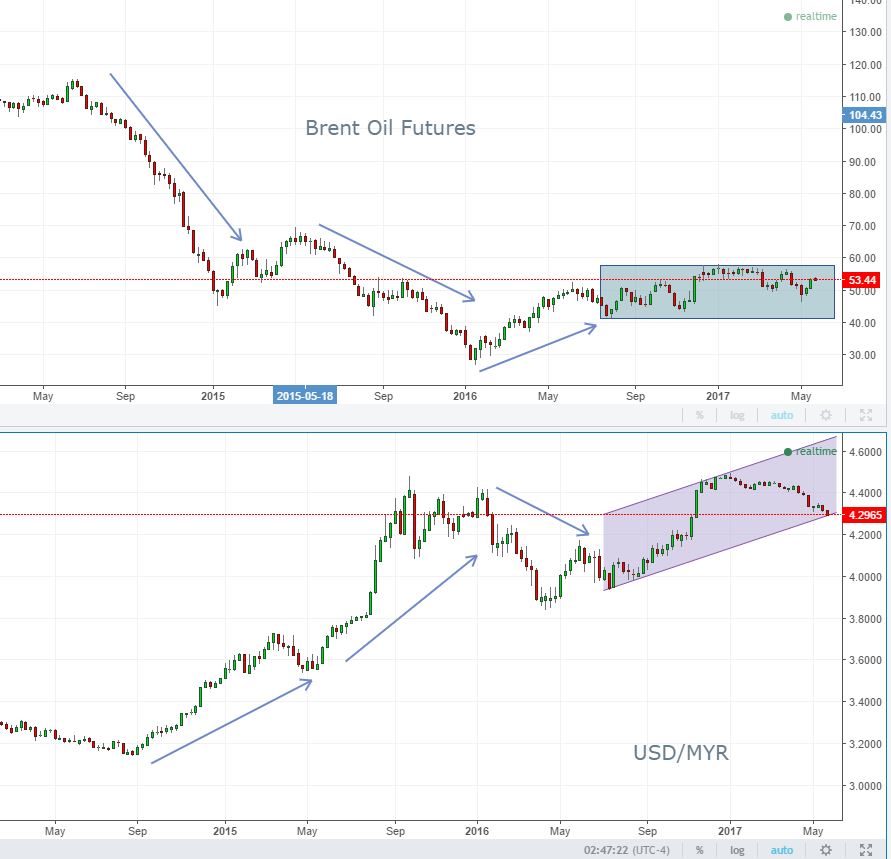The last time this happened - oil prices collapsed
Redstart
Publish date: Wed, 07 Jun 2017, 11:30 AM
Historically for a market like Malaysia who are net exporters of crude oil, the stock market has had a direct correlation with the price of Brent Crude Oil. As the prices rise, so does our currency and the stock market typically follows as well with majority of stocks mirroring the strength of oil prices.
However, in the last 12 months, this hasn't been the case. While prices of crude oil has rise and stabilized, the ringgit has continued to be relative weak against the dollar. If the trend was followed, it should be trending near the RM3.90 to $1 dollar range. The last time this mis-match happened was close to the period before oil prices retraced from the highs of $120. It happened another time in 2010, where oil prices broke through from the $80 to the $120, working the other way around.

Historically what happens after a scenario like this is that prices have trended in favour of the commodity/currency that has the underlying strength in the past 12-18 months. This is MARGINALLY in the favour of oil prices. And because unlike previous situations where there trend was clear, it does indicate for the next 12 months or so, there will be a progressive climb in the direction of higher oil prices and strengthening ringgit.
Longer-term strength is still in the favour of the USD, but at least for the next 12 months or so, we should see a progressive return of stock prices that have typically flourished when USD is weaker.
So where is the opportunity?
Using the logic above, there are a couple stocks that have historically thrived in a weaker USD conditions that we will be covering in our upcoming newsletter.
However, in light of the fact that the underlying longer term strength is with the dollar, it makes sense to also cover the best stocks that are a proxy to the dollar. This could be useful if in the next 12 months once the long term trend we have highlighted is clearer as any unforseen macro conditions might turn oil prices south again. And it pays to be prepared at both sides.
We will be covering the full list in our free Laburlah newsletter coming out this week available at www.laburlah.com
Disclaimer : The information provided here is just the viewpoint of the author. It is not a solictation to buy or sell any specific equities.
More articles on Axel's Market Outputs
Created by Redstart | May 25, 2017
Discussions
Love to see a different viewpoint but can only respond if you share your own views. Maybe you can post one of your own to counter the points. Who knows, you may be right. But broad view, we know what we are looking at now.
2017-06-07 12:20
Its your logic that is problematic.
1. The last time "this" happened - oil prices collapsed. What is "this"? Your title implies a causal relationship which doesn't make sense at all.
2. The period you highlighted, it just shows a weaker correlation between the X rate and oil prices, other factors influencing the two, that's all.
3. The remaining parts of essay, strength of USD, commodity blah blah blah, is just something else unrelated.
In my opinion, near term another collapse is just coming around the corner. For the last 10 years, China economy is powering the whole World's economy. The engine is losing steam now. The kicker of the next crisis is the "one belt one road" thing, which is draining up China's capital, rapidly. Energy will be cheap, transport will be revolutionalise with the introduction of ZPE.
2017-06-08 00:23
I think you might be confusing simple with problematic/wrong. This article focuses on trend and correlation. Its pretty simple to compare, if you use any charts, you can easily see the period when they didn't have an inverse relationship and notice what happened next.
Its going to be hard to counter your 2nd argument, cause you changed the narrative. If I was talking about macroeconomic conditions, then we could have a fruitful discussion. However, the article only focuses on trend and correlation and if indeed it does follow historical situations, then you should look for stocks that typically trend in the direction you think it will go.
So I can't respond to that, cause thats not what I am presenting. But based on the context of what I have written, it not illogical. Depends if a reader buy into it or not. But don't mistake it as being wrong/problematic unless within the same context, you can provide a different view - maybe i'll buy your argument if its better.
2017-06-08 15:39






















supersaiyan3
Just say your analysis is weak.
2017-06-07 12:00